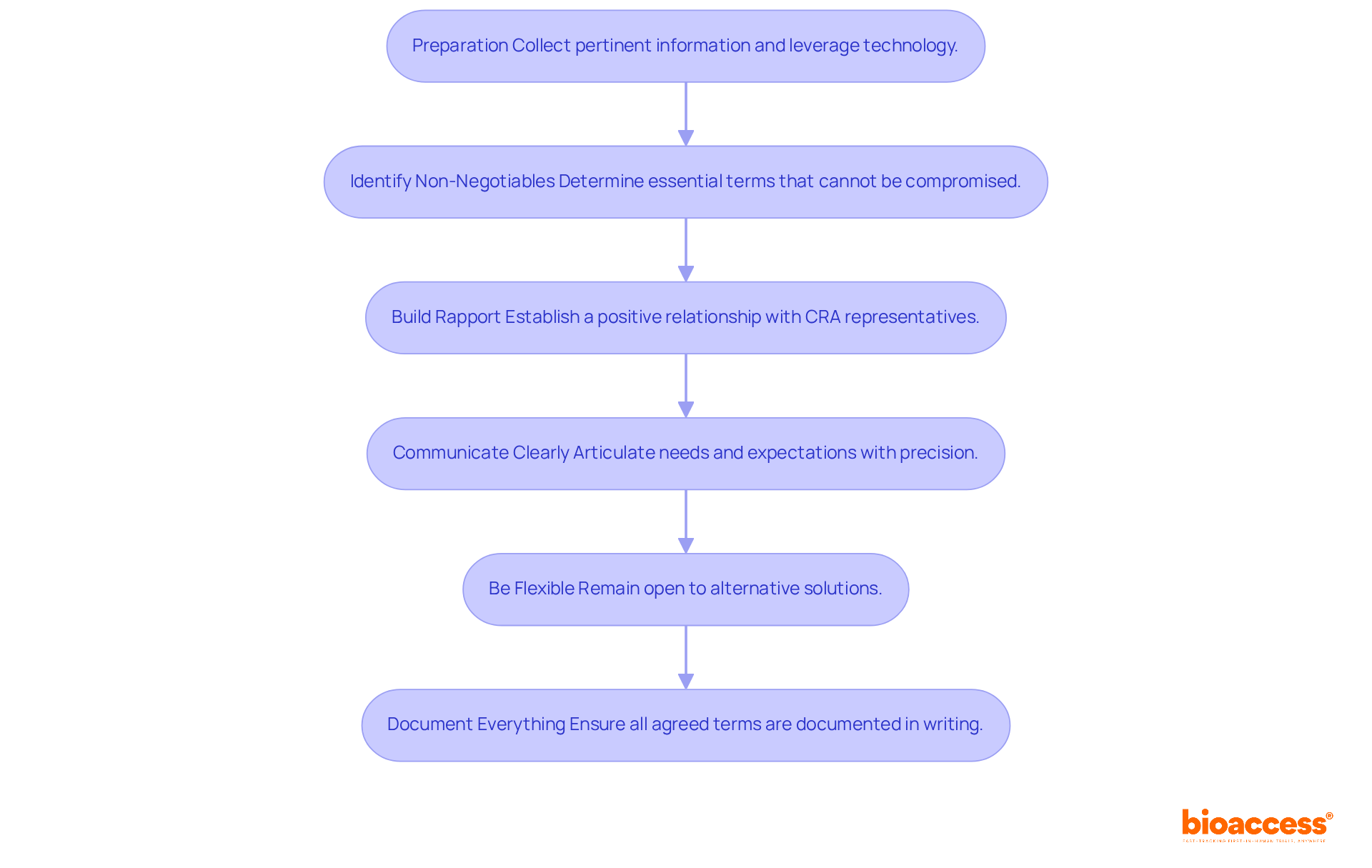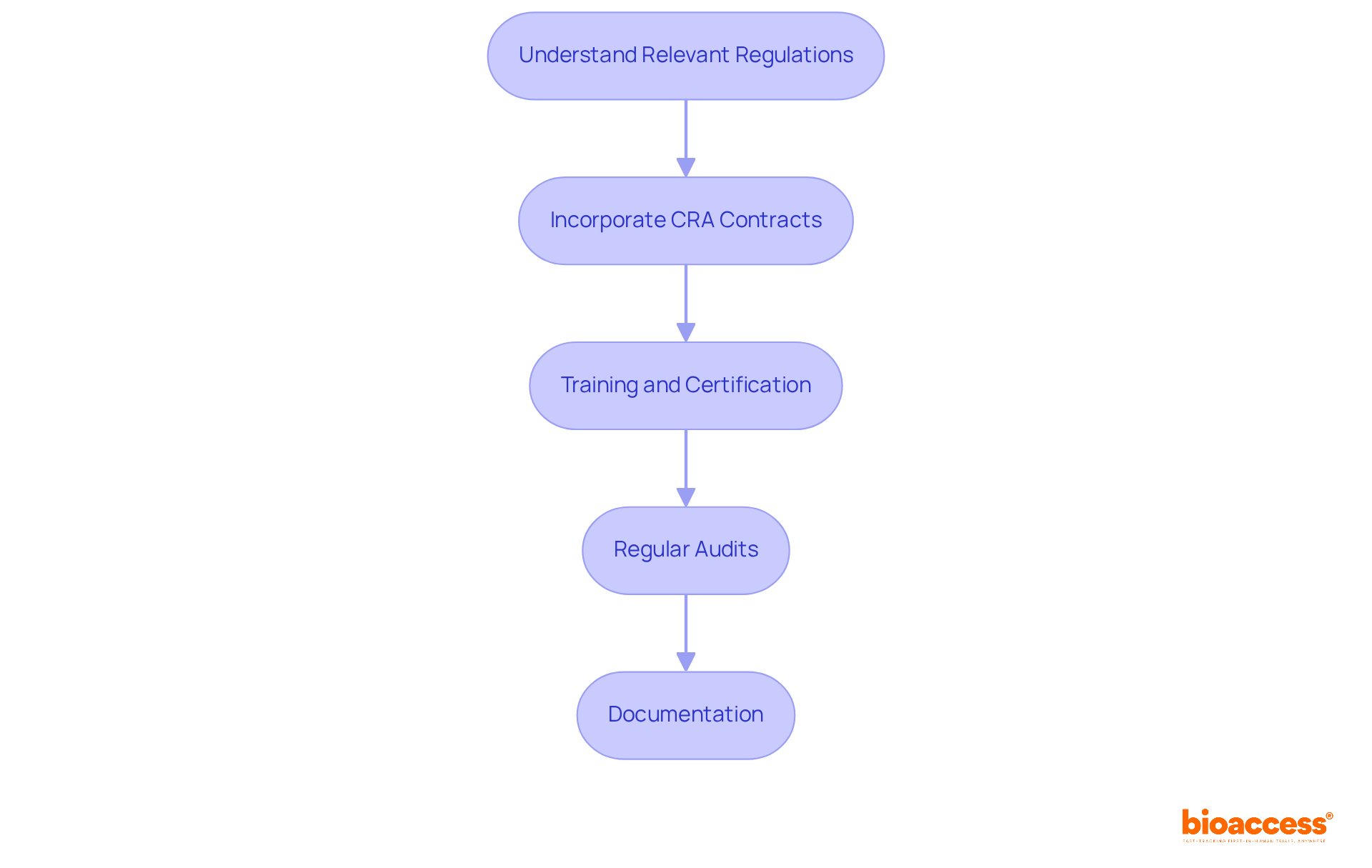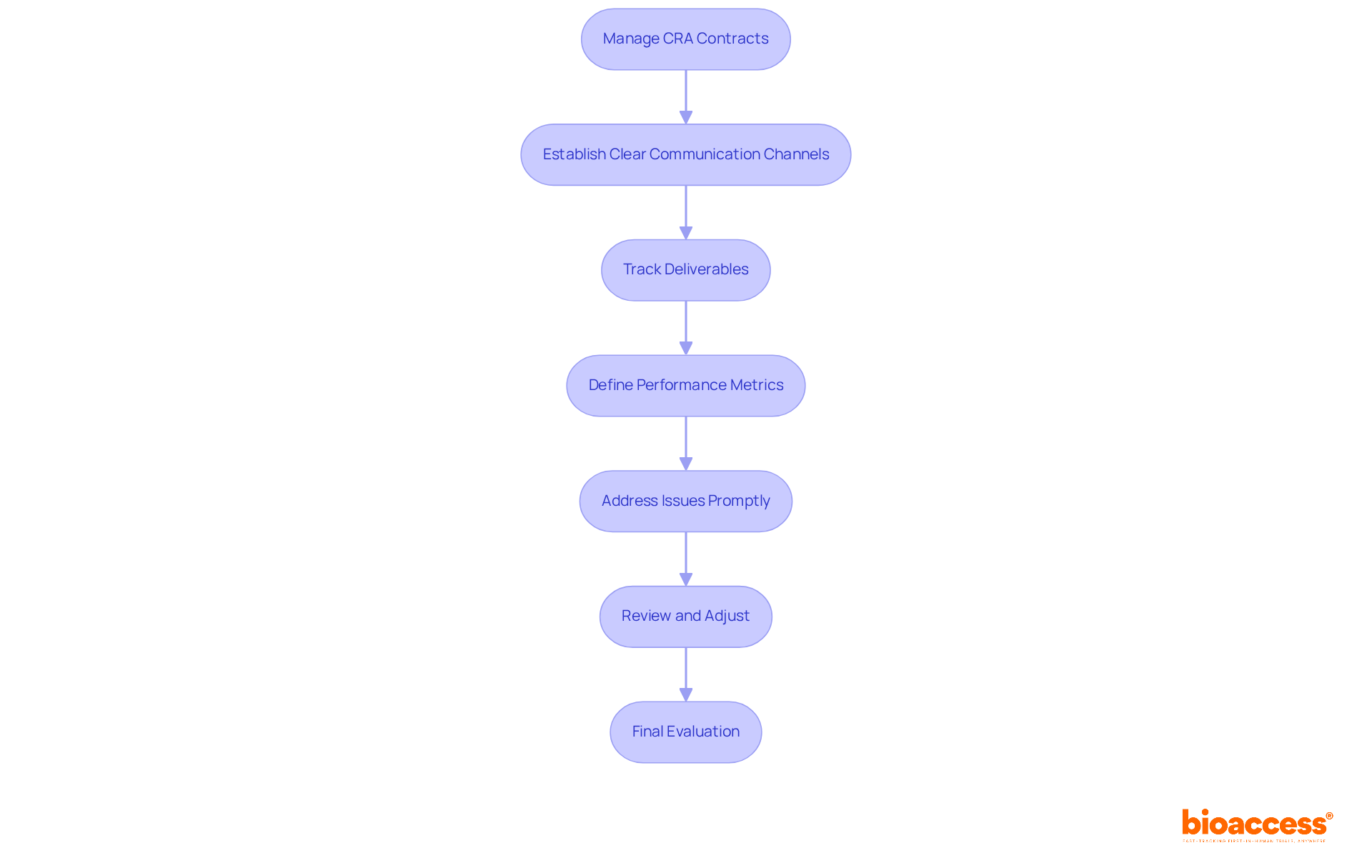


The article titled 'Master CRA Contracts: A Step-by-Step Guide for Clinical Research Directors' provides a comprehensive understanding of effectively managing and negotiating Clinical Research Associate (CRA) contracts. It underscores the importance of clarity, effective communication, and compliance with regulatory standards. Well-structured contracts and thorough preparation are highlighted as critical elements that can significantly enhance the success of clinical trials and foster positive relationships between sponsors and CRAs.
Mastering Clinical Research Associate (CRA) contracts is an essential skill for Clinical Research Directors navigating the intricate landscape of clinical trials. Approximately 85% of studies face challenges in recruiting sufficient patients; thus, the clarity and precision of these contracts can significantly influence successful outcomes. This article explores the critical components, negotiation strategies, and compliance measures vital for effective CRA contract management.
As the research market continues to expand and evolve, how can directors ensure that their contracts not only align with current standards but also adapt to future challenges?
To master CRA contracts, understanding the following key components is essential:
Definition and Purpose: CRA contracts are legally binding agreements that delineate the responsibilities, rights, and obligations of both the sponsor and the CRA. They guarantee alignment on expectations and deliverables throughout the clinical study process. This is particularly crucial, considering that about 85% of studies fail to recruit sufficient patients, often due to ambiguous roles and responsibilities.
CRA contracts are essential for the project. Key Components: Familiarize yourself with the essential elements of a CRA contract, including:
The discussion will focus on CRA contracts. Types of CRA Contracts: Understand the different types of contracts, such as:
Importance of Clarity: Ensure that all terms are clearly defined to prevent misunderstandings and disputes later in the legal proceedings. Clarity is essential for maintaining a positive working relationship between the CRA and the sponsor, especially in a landscape where the average turnover rate for CRAs can reach nearly 3%. This clarity promotes teamwork and improves the overall effectiveness of the research process.
In 2. CRA contracts are essential for the project02. CRA contracts are essential for the project5, the focus on transparency in CRA agreements is more essential than ever, as the sector adjusts to changing regulatory standards and the growing intricacy of research studies. Successful negotiations for CRA contracts often depend on clearly articulated expectations and responsibilities, highlighting the necessity for thorough preparation and comprehension of these arrangements. Moreover, with the research studies market anticipated to reach $69.8 billion by 2. CRA contracts are essential for the project02. CRA contracts are essential for the project7, efficient CRA agreements are crucial for managing the increasing intricacies of the sector.

Effective negotiation of CRA contracts involves several strategic steps:
Preparation: Collect all pertinent information before entering discussions, including market rates for CRA services, prior agreement terms, and the specific needs of your clinical trial. This essential knowledge is vital, as organizations that prepare thoroughly can achieve a 44% increase in management productivity. Additionally, organizations using AI assistants can achieve a similar boost, highlighting the importance of leveraging technology in negotiations.
Identify Non-Negotiables: Clearly determine which terms are essential for your organization and cannot be compromised. Critical elements may include payment terms, timelines, and specific deliverables. Understanding these priorities helps in maintaining focus during discussions.
Build Rapport: Establishing a positive relationship with CRA representatives is vital. A collaborative approach can lead to more favorable outcomes for both parties, as effective communication fosters trust and understanding. Case studies show that building rapport can significantly enhance negotiation success.
Communicate Clearly: Articulate your needs and expectations with precision. Use specific examples to illustrate your points, ensuring that both parties grasp the implications of the terms being discussed. Clear communication can significantly reduce misunderstandings, which are often a source of negotiation delays. Notably, 80% of organizations report having no documented negotiation process in place, underscoring the need for structured communication.
Be Flexible: While it’s important to stand firm on non-negotiables, remain open to alternative solutions that may satisfy both parties. This flexibility can facilitate a smoother negotiation process and lead to innovative solutions that benefit all involved.
Document Everything: Ensure that all agreed-upon terms, particularly the CRA contracts, are documented in writing. This practice protects both parties and provides a reference point for future discussions, reducing the likelihood of disputes. Organizations that digitize agreements report a 55% increase in post-negotiation compliance compared to conventional methods.

To ensure compliance with regulatory standards in CRA contracts, adhere to the following steps:
Understand Relevant Regulations: Familiarize yourself with the regulations governing clinical studies in your jurisdiction, including Good Clinical Practice (GCP) guidelines, FDA regulations, and local laws. GCP is crucial for safeguarding human rights and ensuring the integrity of data from legal proceedings. Non-compliance can lead to serious consequences, including loss of funding and damage to reputation.
Incorporate CRA contracts: Ensure that the CRA contracts include specific clauses mandating compliance with all applicable regulations. This may include:
Training and Certification: Verify that the CRA and their staff are adequately trained and certified in regulatory compliance. GCP training is essential for ensuring that all staff participating in research understand their duties and the ethical standards required.
Regular Audits: Include provisions for regular audits and monitoring to ensure ongoing compliance. This proactive approach helps identify potential issues before they escalate, thereby maintaining the integrity of the trial.
Documentation: Maintain thorough documentation of all compliance-related activities, including training records, audit results, and communication with regulatory bodies. This documentation is essential for demonstrating compliance during inspections and reinforces the commitment to ethical standards in clinical research.

To effectively manage and monitor CRA contracts, it is imperative to implement the following strategies:
Establish Clear Communication Channels: Regular communication with the CRA is essential for discussing progress and providing updates. Scheduled meetings and progress reports maintain alignment and foster collaboration, ensuring that all parties are informed and engaged.
Track Deliverables: Employ project management tools to monitor the CRA's deliverables against the timeline of the agreement. This approach ensures that milestones are achieved and allows for prompt interventions if issues arise, as setbacks can significantly impact outcomes.
Performance Metrics: It is crucial to define key performance indicators (KPIs) to evaluate the CRA's performance. Common metrics include recruitment rates, data quality, and adherence to timelines. Research shows that organizations typically utilize an average of five to seven KPIs to assess CRA effectiveness, providing a well-rounded view of performance.
Address Issues Promptly: When performance issues emerge, it is vital to address them immediately. Open dialogue can often resolve misunderstandings and keep the project on track, as communication breakdowns can lead to protocol deviations and delays.
Review and Adjust: Regularly assess the agreement and its terms to ensure they remain relevant and effective. Be prepared to make modifications as necessary to adapt to changing conditions in the study, which is particularly important given that 70% of clinical studies experience startup delays.
Final Evaluation: At the conclusion of the trial, conduct a comprehensive assessment of the CRA's performance against the agreement terms. This evaluation can inform future contract negotiations and enhance overall project management, ensuring that lessons learned contribute to improved efficiency in subsequent studies.

Mastering CRA contracts is an essential skill for Clinical Research Directors, as these agreements form the backbone of successful clinical trials. A comprehensive understanding of CRA contracts—including their definitions, key components, and types—is fundamental for ensuring that all parties are aligned on expectations and responsibilities. This alignment is crucial in navigating the complexities of clinical research, particularly in an environment where clarity can significantly impact study outcomes.
The significance of effective negotiation strategies cannot be overstated, emphasizing the need for thorough preparation, clear communication, and flexibility. By identifying non-negotiable terms and fostering positive relationships, Clinical Research Directors can facilitate smoother negotiations and ultimately secure agreements that benefit all parties involved. Moreover, ensuring compliance with regulatory standards and implementing robust management practices are critical for maintaining the integrity of the research process and achieving successful trial outcomes.
Given the growing intricacies of clinical research and the projected market expansion, mastering CRA contracts has never been more important. By adopting best practices in negotiation, compliance, and management, Clinical Research Directors can enhance their effectiveness and contribute to the overall success of their clinical studies. Embracing these strategies will pave the way for more efficient research processes, ultimately leading to advancements in medical science and improved patient outcomes.
What are CRA contracts?
CRA contracts are legally binding agreements that outline the responsibilities, rights, and obligations of both the sponsor and the Clinical Research Associate (CRA), ensuring alignment on expectations and deliverables throughout the clinical study process.
Why are CRA contracts important?
They are essential for effective trial management, as they help prevent misunderstandings and disputes, which can be crucial given that about 85% of studies fail to recruit sufficient patients due to unclear roles and responsibilities.
What key components should be included in a CRA contract?
Key components include the Scope of Work, Payment Terms, Confidentiality Clauses, and Termination Conditions.
What does the Scope of Work entail in a CRA contract?
The Scope of Work clearly defines the tasks and responsibilities of the CRA, including feasibility studies, site selection, and compliance assessments.
What are Payment Terms in CRA contracts?
Payment Terms detail the compensation structure, including milestones and payment schedules, ensuring transparent financial expectations.
What is the purpose of Confidentiality Clauses in CRA contracts?
Confidentiality Clauses safeguard sensitive information exchanged during the clinical study, preserving trust and adherence among parties involved.
What are Termination Conditions in CRA contracts?
Termination Conditions outline the circumstances under which the CRA contracts can be terminated by either party, providing a safety net for both sides.
What types of CRA contracts exist?
The main types include Clinical Trial Agreements (CTAs), which detail the terms of the study, and Service Agreements, which cover services offered by the CRA, such as monitoring and data management.
Why is clarity important in CRA contracts?
Clarity in CRA contracts is essential to prevent misunderstandings and disputes, fostering a positive working relationship between the CRA and the sponsor.
How do changing regulatory standards affect CRA contracts?
As the sector adjusts to changing regulatory standards and the increasing complexity of research studies, transparency in CRA agreements becomes more essential for successful negotiations and project management.